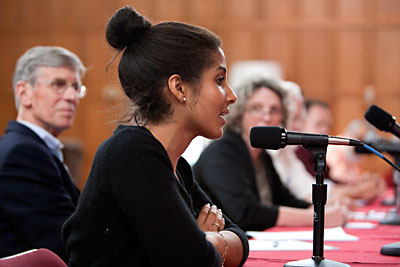Faculty and students discuss ways to overcome stress
By Susan Kelley

In a new effort to think about how to defuse student stress, professors and undergraduates sat down to talk together about the problem at a campus forum on academic rigor and student support. Faculty and students alike must make the effort to work together to reduce the stress that students are feeling, panelists said at the April 6 forum, held at Willard Straight Hall.
Such reconciliations "are rare at this point," said panelist Eric Przybyszewksi '11. "But further promoting these kinds of programs to increase the connectivity between these two communities would be an enormous asset, not only to the students but also to the faculty community as well."
As a positive example he cited senior chemistry lecturer Tom Ruttledge, who, he said, serves as more of a friend than a teacher to him. "He's taught me a lot about pushing boundaries and taking the path less traveled." But, he said, "that hasn't come through working with him in the chemistry lab. It's been through outside experiences -- seeing him at hockey games, talking with him about athletics and travel and politics, issues completely unrelated to chemistry." Przybyszewski added that Ruttledge makes a point to sit in the student section during hockey games.
Dean of the University Faculty William Fry framed the discussion, which drew about 50 students and faculty, as one of many responses to President David Skorton's spring 2010 challenge to enhance the Cornell student experience.
Bruce Lewenstein, professor of communication and science and technology studies, voiced surprise at how few students take advantage of office hours. "I see almost no students in a class of 130 people except when I've just handed back an assignment and people are unhappy with their grades," he said. "[Faculty] have to show that there's not much of a barrier, but we'd like feedback too -- people coming in and seeing us." A senior replied that some students are unsure what an office-hours visit is supposed to accomplish. "It's important for faculty to understand that for a student, going to office hours is not always as easy as it seems," she said.
The first step toward reducing the pressure students feel is to view stress as coming from many factors, not just academics, said Jed Sparks, associate professor of ecology and evolutionary biology. Faculty must develop relationships with students by asking how they are doing. "That is where you get the important answers," he said. He also called for a shift in Cornell's culture, "from a competitive, individual evaluation structure to [one where] every student thinks they're here for personal development."
Panelists had many suggestions for faculty. David Gries, associate dean of engineering for undergraduate programs, said faculty should ask students how many hours they spend on each assignment, and call in students who are taking too long on assignments and figure out why. They should also give fewer prelims, and realize that theirs is not the only course that students are taking, he said.
Perhaps the most important thing faculty can do is serve as a model, said panelist Shawkat Toorawa, associate professor of Arabic literature and Islamic studies. For example, he told his students that he had not written an article over spring break as planned. "By divulging this, I'm saying it's possible to still be a functional and perhaps even respected human being and have missed a deadline."
Sarah Ghermay '11, chair of Black Students United, suggested that faculty make students feel more welcome in class by embracing their diversity, by, for example, mentioning holidays. Faculty should also acknowledge that students often juggle academics and meaningful extracurricular activities, she said.
Students also have a role to play, panelists said. For example, they can view college as an opportunity to learn about what kind of environment they'd best thrive in, suggested Kathy Gleason, associate professor of landscape architecture. "While you're at Cornell, seeing that professor less as a terrible teacher and more as a lesson in the kind of boss that you might not thrive under can help to ease the stress a bit."
The forum was co-sponsored by Black Students United, the Student Assembly and Cornell Minds Matter.
Cornell fosters a healthy educational environment
Cornell promotes the mental health of its students by caring for the whole person with a comprehensive public health approach that takes its cues from the best practices in the field.
Some of the formal strategies Cornell uses to foster a healthy educational environment include:
- The Executive Committee on Campus Health and Safety: Senior administration provides oversight of health policy and strategies, including mental health-related initiatives;
- The Council on Mental Health and Welfare: Staff, faculty and student leaders guide development of the university's mental health strategies;
- The President's Council on Alcohol and Other Drugs: Staff, faculty and student leaders oversee development of prevention and intervention strategies related to alcohol and other drug abuse, associated violence and hazing; and
- Student leadership: Student Assembly initiatives and the Graduate and Professional Student Association's ad hoc mental health committee demonstrate the high priority of health and well-being to the student community.
Media Contact
Get Cornell news delivered right to your inbox.
Subscribe